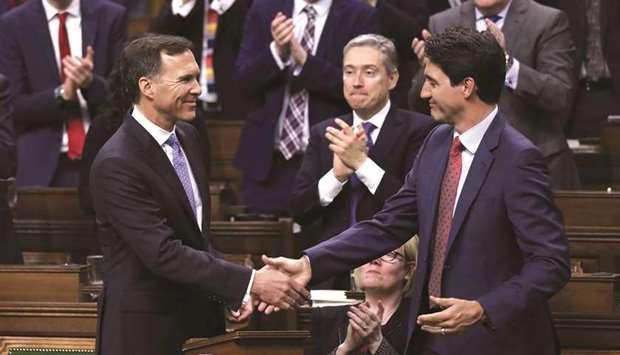Canada’s government doled out goodies on Tuesday for almost everyone in an election year budget that looks to brace a slowing economy and sagging support for Justin Trudeau’s Liberals.
The spending binge appeared calculated to appeal to the broadest number of voters.
But pundits said it likely won’t be enough to turn the page on a political scandal dogging Trudeau, and lamented a lack of signature initiatives and no clear path to a balanced budget.
For weeks, the Trudeau government has been rocked by accusations it sought to shield engineering giant SNC-Lavalin from prosecution for alleged fraud and bribery in Libya.
Four senior officials quit over the scandal, plunging the Liberals behind the opposition Tories in opinion polls for the first time in the golden boy premier’s first term.
With only seven months until the next election and the economy forecast to brake suddenly before then, the Liberals desperately needed to wow voters.
In a speech to parliament delayed by a Tory protest over the SNC-Lavalin affair, Finance Minister Bill Morneau pointed to past achievements — 900,000 new jobs since 2015 and the lowest unemployment in 40 years — while acknowledging fears that the best is behind Canadians.
“There’s a growing sense of uncertainty taking root around the world,” Morneau said. “And Canada is not immune to those worries.”
“A good job, the ability to make ends meet, the chance to build a life that’s at least as good as the one your parents had — that’s what we all want,” he said. “With this budget we are continuing our proven and successful plan of investing in the middle class.”
Canada’s economy surged after the Liberals took office in 2015 and unleashed a massive stimulus.
But growth is forecast to slow to 1.8% this year and 1.6% in 2020.
Under the government’s plan, the fiscal deficit would balloon to C$19.8bn (US$14.9bn), or 0.9% of Canada’s gross domestic product.
It includes slightly higher revenues of C$338.8bn, and C$355.6bn in program spending and public debt charges.
Over five years, new spending would top C$18bn.
The federal debt, meanwhile, is forecast to rise to C$705.4bn, or 30.7% of the economy, and keep rising with no end in sight.
New initiatives include affordable housing for millennials, faster rural internet, arresting the decline of Canada’s 70-plus indigenous languages, electric car incentives and boosting seniors’ benefits.
There is also cash for cancer and dementia care, anti-hate initiatives and tighter controls at the US border.
Former parliamentary budget officer Kevin Page noted more than 120 budget measures he framed as “a lot of sprinkles to make a lot of constituents as happy as possible.”
“In the context of a two trillion dollar economy, that spending is not going to change the economy fundamentally, but could make people’s lives a little bit better with relatively small amounts — that’s the gamble the government is taking,” Page told AFP.
In some areas, such as a child welfare crisis gripping indigenous communities, “a little money could make a big difference.
There could be enough of those measures throughout the budget,” Page said.
“But it’s not a budget politically that is going to change the dial on the current (scandal).”

Canada’s Prime Minister Justin Trudeau shakes hands with Finance Minister Bill Morneau after Morneau delivered the budget in the House of Commons on Parliament Hill in Ottawa on Tuesday.
